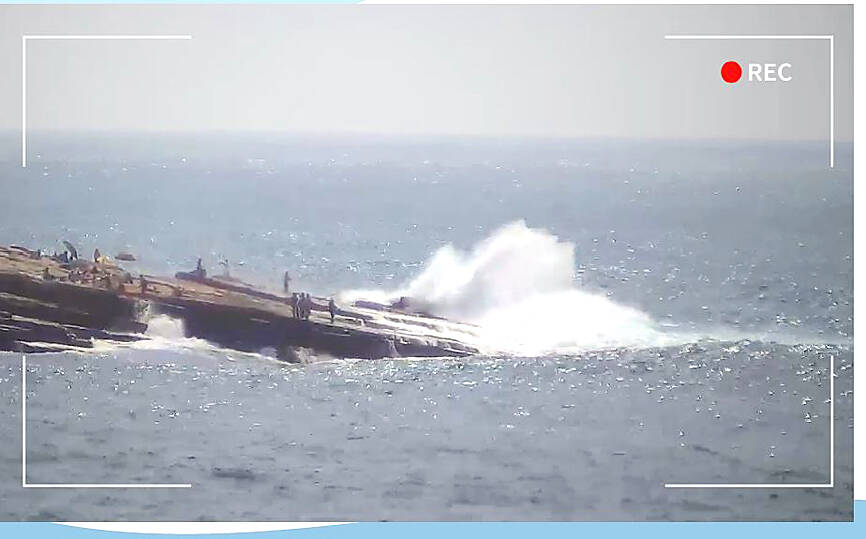The Central Weather Administration (CWA) and National Cheng Kung University have developed an artificial intelligence (AI)-powered system to predict rogue waves, which is expected to be rolled out nationwide by the end of the year, the agency said yesterday.
Rogue waves, also known as “freak waves,” are large, unpredictable surface waves that can pose a serious safety risk.
Many factors can cause rogue waves, although the precise mechanisms of their development, timing and locations are under-researched, university Department of Hydraulic and Ocean Engineering professor Doong Dong-jiing (董東璟) said.

Photo courtesy of the Central Weather Administration
The system, the first of its kind in Taiwan, is a pioneering technology, he added.
The system is being used in New Taipei City and national scenic areas along the north and northeast under the Tourism Administration’s jurisdiction, CWA Deputy Administrator Fong Chin-tzu (馮欽賜) said.
Over the past 25 years, Taiwan has experienced an average of 17 rogue waves annually, sweeping an average of 30 people per year out to sea, CWA data showed.
The agency began the project by monitoring the occurrence of rogue waves and building a database, which was used to train an AI model to give more accurate predictions of their formation, Fong said.
The system, which began development in 2017, uses cameras to monitor the coast and identify abnormal waves, combining information with data provided by the CWA’s wave models and an AI prediction model to assess the likelihood of a rogue wave occurring within 24 hours.
As one of the main causes of rogue waves are swells, swell data is also incorporated into the machine learning, CWA Marine Meteorology and Climate Division head Pan Chi (潘琦) said.
The agency has established at least one abnormal wave monitoring station in 15 coastal cities and counties across Taiwan, and expects to add another by the end of the year, he said.
If an area needs additional monitoring systems, it can request assistance from the CWA, he said.
The New Taipei City Fire Department and the Rueifang District (瑞芳) Office have already budgeted for an additional warning system at Bianfudong (蝙蝠洞), or the “bat cave,” in Rueifang, an area prone to rogue waves, Pan said.
If a dangerous wave is detected, the system would immediately notify disaster prevention personnel to safely evacuate visitors from the area, he said.
The agency has not yet decided on whether to send cellphone alerts of rogue waves, which would require following the Disaster Prevention and Protection Act (災害防救法), he said.
The CWA currently provides forecasting information, while on-site responses are handled by local authorities and relevant agencies, he added.
Early warning information is to be made available on the CWA Web site and weather app, Pan said.

ALIGNED THINKING: Taiwan and Japan have a mutual interest in trade, culture and engineering, and can work together for stability, Cho Jung-tai said Taiwan and Japan are two like-minded countries willing to work together to form a “safety barrier” in the Indo-Pacific region, Premier Cho Jung-tai (卓榮泰) yesterday said at the opening ceremony of the 35th Taiwan-Japan Modern Engineering and Technology Symposium in Taipei. Taiwan and Japan are close geographically and closer emotionally, he added. Citing the overflowing of a barrier lake in the Mataian River (馬太鞍溪) in September, Cho said the submersible water level sensors given by Japan during the disaster helped Taiwan monitor the lake’s water levels more accurately. Japan also provided a lot of vaccines early in the outbreak of the COVID-19 pandemic,

The Ministry of Foreign Affairs (MOFA) yesterday voiced dissatisfaction with the Comprehensive and Progressive Agreement for Trans- Pacific Partnership (CPTPP), whose latest meeting, concluded earlier the same day, appeared not to address the country’s application. In a statement, MOFA said the CPTPP commission had "once again failed to fairly process Taiwan’s application," attributing the inaction to the bloc’s "succumbing to political pressure," without elaborating. Taiwan submitted its CPTPP application under the name "Separate Customs Territory of Taiwan, Penghu, Kinmen and Matsu" on Sept. 22, 2021 -- less than a week after China

Kaohsiung Mayor Chen Chi-mai (陳其邁) on Monday announced light shows and themed traffic lights to welcome fans of South Korean pop group Twice to the port city. The group is to play Kaohsiung on Saturday as part of its “This Is For” world tour. It would be the group’s first performance in Taiwan since its debut 10 years ago. The all-female group consists of five South Koreans, three Japanese and Tainan’s Chou Tzu-yu (周子瑜), the first Taiwan-born and raised member of a South Korean girl group. To promote the group’s arrival, the city has been holding a series of events, including a pop-up

A home-style restaurant opened by a Taiwanese woman in Quezon City in Metro Manila has been featured in the first-ever Michelin Guide honoring exceptional restaurants in the Philippines. The restaurant, Fong Wei Wu (豐味屋), was one of 74 eateries to receive a “Michelin Selected” honor in the guide, while one restaurant received two Michelin stars, eight received one star and 25 were awarded a “Bib Gourmand.” The guide, which was limited to restaurants in Metro Manila and Cebu, was published on Oct. 30. In an interview, Feng Wei Wu’s owner and chef, Linda, said that as a restaurateur in her 60s, receiving an